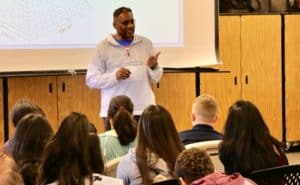 I recently came across a fascinating story about a West Texas pastor who shelters migrants—despite the fact that he generally “appreciates” former president Trump’s “hardline stance on immigration.” “Pastor E,” as the writer of this piece—Carrie McKean—calls him, is rallying his church community to provide meals, shelter, bathrooms, and showers for recently arrived migrants who have nowhere else to go. His congregation is making a difference in people’s experiences. They are decreasing the misery of an inhumane system that doesn’t allow recent migrants to work legally—which most migrants very much want to do. The work Pastor E and his community are doing is wonderful work. It is deeply Christian work. It is the work of a God who guides people of faith over and over again, throughout the scriptures, to care for the widow and the orphan, the stranger and the immigrant. It is the work of a God who reminds God’s people, again and again, that they too were once oppressed foreigners in a strange land—and so they should welcome today’s immigrants with compassion and dignity.
I recently came across a fascinating story about a West Texas pastor who shelters migrants—despite the fact that he generally “appreciates” former president Trump’s “hardline stance on immigration.” “Pastor E,” as the writer of this piece—Carrie McKean—calls him, is rallying his church community to provide meals, shelter, bathrooms, and showers for recently arrived migrants who have nowhere else to go. His congregation is making a difference in people’s experiences. They are decreasing the misery of an inhumane system that doesn’t allow recent migrants to work legally—which most migrants very much want to do. The work Pastor E and his community are doing is wonderful work. It is deeply Christian work. It is the work of a God who guides people of faith over and over again, throughout the scriptures, to care for the widow and the orphan, the stranger and the immigrant. It is the work of a God who reminds God’s people, again and again, that they too were once oppressed foreigners in a strange land—and so they should welcome today’s immigrants with compassion and dignity.
As godly as this work is, it is also, apparently, potentially illegal.
McKean puts it this way: “The relief work he’s doing brushes up against enough legal gray areas that attorneys counseled me…to keep E.’s identity anonymous to protect him from possible legal repercussions.” Helping migrants find work opportunities even though they are not legally permitted to do so may constitute a breach of current US laws. Pastor E does it anyway. I think of the moment in the book of Acts when Peter and the apostles declare, “We must obey God rather than any human authority” (Acts 5:29). Pastor E bravely follows their lead.
I’m inspired by Pastor E’s work, his courage, and the crucial questions he raises as he engages with migrants in his West Texas community. He finds himself asking: What does love look like in this complex situation? And how do those of us who are not recent migrants honor recent migrants as fellow image-bearers of God? I love these questions. And I love the answers Pastor E and his church community are living out in their day-to-day lives.
At the same time, though, I find myself deeply frustrated with the connections not being made between love and politics. McKean writes that questions of immigration policy are not Pastor E’s “primary concern.” She then goes on to say this: “Neither are they mine, nor, most likely, should they be yours. Most of us will never be in a position to steer US immigration policy, but we will have opportunities to love our neighbors well.” McKean argues that we must not “busy ourselves with political debates we cannot solve.”
This strikes me as deeply defeatist. I am sympathetic to the view that there are things we can change, and things we can’t change, and we should focus on the things we can. But I don’t know that I am quite so ready to give up on US democracy—or at least on the power of nonviolent revolutionary action to spark change. (I would highly recommend Rebecca Solnit’s book Hope in the Dark and Andre Henry’s book All the White Friends I Couldn’t Keep for inspiration along these lines.)
It is true that most of us will never be US presidents, senators, congressional representatives, or Supreme Court Justices—although I would love to see more and more ordinary people who want to make a difference run for these positions, rather than writing ourselves off because we don’t come from a politically well-connected family, sport a degree from a specific school, or have a particular career background. But even if most of us will never be in positions that wield national decision-making power, all of us can vote. All of us can put pressure on our leaders. We can engage in activism that helps our leaders move toward crafting more compassionate, just, peace-building policies.
When we realize that love requires dubiously-legal action—that we may be breaking current laws by “not neglect[ing] to show hospitality to strangers,” as Hebrews 13:2 puts it—it is a natural next step to reexamine these laws.
What does it mean to “love your neighbor as yourself” (Mark 12:31) in a situation where our neighbors are subject to unjust laws?
We find ourselves wanting to work together to change those laws. We want immigrants to be able to legally contribute to the US economy in the ways they want to contribute. We want migrants to be legally protected from the all-too-real risks of trafficking and labor exploitation.
None of these policy changes is likely to be made immediately—or easily. But they are all things we can advocate for. Yes, the practical, urgent work of compassion makes an immediate difference in real people’s lives right now, more so than any one of our political views. But political views matter, too. They, too, make a real difference.
Laws around same-sex marriage, for example, changed as the tide of public opinion shifted dramatically—which, in turn, happened because of the brave and costly efforts of LGBTQ+ activists, advocates, and other ordinary people who chose to believe their actions could make a difference.
When we become aware that there is tension between our political views and what love requires of us, we can change our political views.
We “love our neighbors well” not only by caring for them directly but also by caring about the policies that impact their lives, often in devastating ways. Love and our politics do not have to exist in tension. We can let love shape our politics.
I deeply admire Pastor E’s courage to do what love requires, regardless of his political views. But I also want Christians to be able to examine our political views where they are in conflict with love. I want us to be willing to change. And I want us to dare to believe that both our actions and our beliefs matter—that ordinary people can make a difference in confronting inhumane laws. We can both shelter migrants and move to change the policies that leave them without options.
 Liz Cooledge Jenkins is a Seattle-based writer, preacher, and former college campus minister, and the author of Nice Churchy Patriarchy: Reclaiming Women’s Humanity from Evangelicalism. She blogs regularly at lizcooledgejenkins.com and can be found on Instagram as @lizcoolj and @
Liz Cooledge Jenkins is a Seattle-based writer, preacher, and former college campus minister, and the author of Nice Churchy Patriarchy: Reclaiming Women’s Humanity from Evangelicalism. She blogs regularly at lizcooledgejenkins.com and can be found on Instagram as @lizcoolj and @


